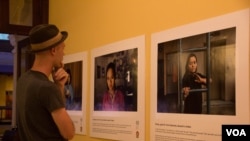A new photo exhibit in Phnom Penh documents the stories of abuse faced by migrant workers abroad.
US journalist Karen Emmons and photographer Steve McCurry spent 18 months interviewing and photographing 25 women from four countries in Asia, where they documented stories of abuse, child labor, forced labor, human trafficking, rape and starvation of workers.
The exhibit of photographs "No one should work this way" is on display at the Foreign Correspondents Club in Phnom Penh.
In one image, an Indonesian woman named Sita, who suffered abuse as a domestic worker in Saudi Arabia, Oman and Hong Kong, sits on a staircase, looking into the camera. Her eyes look sorrowful. A caption reads: “She said, ‘Come here, dog. Come here. You are stupid. You are a dog. Helper comes here.’”
Emmons, who has spent more than 20 years in Asia, told VOA Khmer that she has heard a lot of abuse stories from reports, friends and other sources, which made her angry.
The project came about after she was asked to write a report for the International Labor Organization and met 25 women who were physically abused.
“I thought there must be so many people out there,” she said. The challenge was to tell the stories of people who are being abused behind closed doors. When she learned about the women who had come home, she said, “I thought, OK, we show the scars. That’s how we do it, visually. These people have returned home. They are not in somebody’s house. And the scars are the evidence of what’s being done.”
Marisa Tan, managing director of Maid in Cambodia, an organization that trains Cambodian domestic workers in an effort to protect them, said Cambodians are not alone in being abused. The problem is international, she said. “Sometimes, people feel isolated, that it’s only me, but it is not.”
Say Solyda, a staff member from the Documentation Center of Cambodia, who came to see the exhibition, said the photographs and stories helped her understand what she had read in news reports.
“I think it is important for me as a citizen to know about it, that is why I think I should spend one evening to join this event to understand clearly about the abuse of domestic workers,” she said.
Emmons said she hopes there will be more coverage of the issue and that one day people will be as aware of it as they are domestic violence.
“A lot of people know, maybe, that their neighbor isn’t such a good employer and is doing horrible things to their domestic workers and they stay silent,” she said. “I just tried to create, one day, an atmosphere, an environment, where maybe they all feel less inclined to be silent.”
Emmons said that bans on migration, such as the one enacted by Prime Minister Hun Sen in 2011, in the wake of reports of abused workers, is not a solution.
“Women will find a way to go,” she said. “Safe migration is the answer.” That includes a strong labor law and the ratifying of ILO conventions. “I’d like to see Cambodia take the lead in the region and push for more mechanisms put in place to protect the migrants.”







